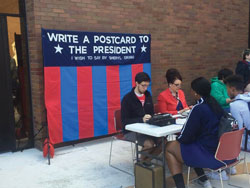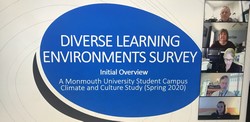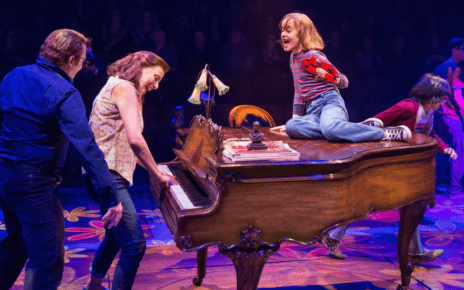Sheryl Oring, creator of the ‘I Wish to Say’ project, visited the patio of the Rebecca Stafford Student Center (RSSC) on Friday, Oct. 7 to present a glance at American public opinion on presidential politics. Dressed as a vintage secretary with a portable public office equipped with a manual typewriter, Oring gave students the opportunity to dictate letters to the president and presidential candidates.
“I was questioning if we really know what Americans think about our candidates,” artist Sheryl Oring said in an interview with TakePart. “I wanted to come up with a way of going around and talking to people who might not normally show up in a news story.”
Created in 2004, Oring began the project as an attempt to reconcile the alienation she felt after living for six years in Germany and returning to America. According to Oring, when one is outside of the country for an extended period of time, they often develop an outsider-looking-in’s point of view, and are able to see things from a new perspective. Oring wanted a medium through which people could adequately express their political views.
Corey Dzenko, Ph.D., an associate professor of art who met Oring in 2012 and helped bring her project to campus, said that such an event is very important because it gives students the opportunity to speak about current affairs.
The project, hosted by the University’s ART NOW program, is an attempt to mix politics and performance art in order to pique the interest of the youth and get them involved in the political process.
Dzenko frequently aided with the typewriting process beside Oring in the past. Oring typically invites other professors or students to help her transcribe the messages, as the lines are “often tremendous.” Oring said, “The type writer is definitely a key. If people are old enough, they remember it, and if they are young enough, they are curious as to why it’s here.”
Oring added, “In 2004, there weren’t any smartphones, so now it’s a little harder to break through to people on the streets. That’s why I typically have a student assistant to interact with the public and encourage them to participate.”
Anthony Cosentino, a senior photography student, said, “I think it’s important for students to speak about politics because many younger people generally try to avoid getting into politics, and as a result the older generation ends up making decisions for the younger generation because they actually go out and vote. I think it’s important for students to get involved in politics so that they’ll have more of a say in the future of their country, as opposed to the older generation making decisions about a future they won’t even be around to see.”
Cosentino added that the project helps students, and everyone that participates, realize that their voice, and therefore their vote, has a meaning.
After the event concluded, Oring hosted a Q & A in Magill Commons clubroom, where she discussed the purpose of her project and answered student and faculty questions.
Ava McClendon, a junior art student, said that politics often go unnoticed by many young people, but Oring’s event did a great job of bringing certain concerns to light and urging the students of today to get involved. “I think it’s important for students to speak about politics because like anyone else, it effects our lives. The only difference is that we specifically have important and influential issues that are a part of our future,” said McClendon. “I think this experience makes people more aware about how important this election is and they will learn to take it more serious.”
To date, over 2,200 postcards have been written and sent to the White House. Oring will continue to bring the project to universities and cities around the country, as there are still people who wish to be heard.
IMAGE TAKEN by Rich Felicetti



